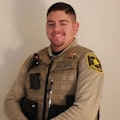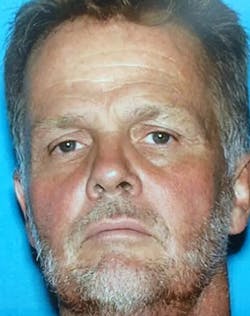How to Catch A Criminal: Killer Keeps Family's True Fate Hidden for Years
What to know
- In 2010, the McStay family of four went missing, and an investigation into the disappearance led authorities to believe they walked away from their lives voluntarily.
- But in 2013, the family's remains were discovered in the Mojave Desert, and their disappearance turned into a homicide investigation.
- Charles Merritt, a business associate who was in debt to Joseph McStay, was convicted and sentenced to death in 2020 after evidence linked him to the murders.
More on OFFICER.com
Download the May/June issue of OFFICER Magazine.
Click Here to subscribe to OFFICER Magazine.
Every officer with a decent amount of time on the job knows the unexpected turns an investigation can take. Seeing a major case through to completion often involves giving up on a theory and taking your investigation in a different direction as new information becomes available. In How to Catch A Criminal, we look at the many ways not-so-perfect crimes are solved. This month, a missing family turns up in the worst way.
Among the many great freedoms afforded to the citizens of this nation is the right to privacy. Nobody has to tell anyone else about their personal business or decisions. If you want to quit your job, move to another town, use a fake name, get a bad tattoo, or make any other changes to your life, you can. There is no requirement to keep others informed of your personal life. So long as you don’t abandon any children or other dependents, you can choose to leave your life behind and nobody has to know. Respecting the privacy of law-abiding citizens is of extreme importance for Law Enforcement. Sadly, sometimes respecting this line in the sand can also prevent a crime from being discovered.
On Nov. 11, 2013, a dirt-biker traveling through the Mojave Desert near Victorville, California, came across pieces of bone that caught his attention. Further inspection indicated the bones were in fact parts of a skull. The biker contacted the San Bernardino County Sheriff’s Office who sent investigators to the scene. A little digging at the site unearthed two shallow graves, each containing the remains of an adult and a child. All of the victims had suffered apparent blunt force trauma to the head, most likely from a sledgehammer found in one of the graves. One of the adult bodies, a male, had an electrical cord around his neck. It was obvious this was the burial site of a family of four that had been savagely murdered and dumped here years before.
Despite years having passed, this remote area of the Mojave Desert hadn’t changed much. Investigators were able to locate a single set of tire tracks leading to the grave site, and at least determine the axle width of the vehicle that evidently brought the family to the burial site. Once the scene was processed and the available evidence collected, the next step was to identify the remains, which didn’t take long. On November 13th, the adult remains were officially identified as that of 40-year-old Joseph McStay and his wife, 43-yearold Summer. Days later, the child remains were determined to be their children, 4-year-old Gianni and 3-year-old Joseph Jr. Given the remains had been buried for years, someone must have noticed the McStay family was missing.
More on OFFICER.com
How to Catch A Criminal: Murder Uncovers Love Triangle of Deception
- When a 22-year-old man was found shot dead as he was leaving work, investigators discovered phony online identities and a fantasy fling that led to a jealousy-filled fatal reality.
On the evening of Feb. 4, 2010, neither Joseph nor Summer were responding to calls or texts from family members despite contact earlier in the day. Days went by and nobody had been able to reach the McStays. Joseph’s brother Michael traveled to the McStay residence in Fallbrook, California, on Feb. 13, in order to check on the family in person. When no one came to the door, Michael climbed through a window, but found the home was unoccupied. The family dogs had been left inside and food had been left out of the refrigerator. Important items had been left behind, indicating the McStays hadn’t packed bags and gone on a vacation. It appeared they were in the middle of their normal daily lives when they suddenly vanished.
Michael eventually called the San Diego County Sheriff’s Office to report Joseph and his family missing. After a preliminary investigation, a search warrant was executed on the McStay home on Feb. 19, 2010. Investigators found the home had not been broken into, and there were no signs of a struggle. Cell phone data indicated Joseph and Summer were home on the 4th, and their phones had not pinged off any other towers since. Their personal bank accounts did not show any activity since the day of their disappearance, or any withdrawals beforehand that would indicate the McStays were going off the grid, cash only. One thing that stood out was online searches on the family computer for what sort of documents are needed for children to travel to Mexico.
Investigators questioned an employee of Joseph McStay’s business, Charles Merritt, and determined he was the last person to see Joseph McStay. Merritt explained he was a welder who specialized in decorative fountains, which Joseph’s business sold. Merritt stated they met for lunch on February 4 and discussed a lucrative contract coming up. There was nothing special about the meeting and according to Merritt, Joseph went straight home afterward. They even spoke several times on the phone as Joseph drove home.
During the search of the home, investigators learned the family’s SUV was missing. A check of the vehicle’s information showed that it was recently impounded, having been towed from a parking lot in San Ysidro California, right along the Mexican border. The car was towed on Feb. 9, having been abandoned there some time before.
With assistance from authorities at the Mexican border, surveillance footage was obtained which showed a man, a woman, and two small children walking across the border on the night of Feb. 8. This footage put the finishing touches on the Sheriff’s Office’s theory: The McStay family was not missing, they had voluntary left their lives behind to start over in Mexico, as is their right. This theory was doubted by the McStay’s family and friends, but at the time there was little evidence to the contrary, and this was seemingly the most likely scenario. That theory stood up for nearly four years, until the discovery in the desert in 2013.
More on OFFICER.com
How to Catch a Criminal: Bad Doctor Writes Prescriptions for Double Murders
- A not-so-good physician had a need to make others pay for his bad medicine mistakes, ultimately committing a pair of revenge-fueled, double murders five years apart.
After identifying the remains and deeming the case a homicide, the San Bernardino County Sheriff’s Office led the investigation, since the remains were found in their jurisdiction. Now that it was confirmed there had been a crime, investigators had authority to dig deeper into the lives of the McStay family, including obtaining a search warrant for the business’ financial records.
The records showed that Charles Merritt had written himself $21,000 in checks from the business account, and deleted those entries from the business’s finance software on Feb. 8. His cellphone also pinged in the Victorville area around the time of the disappearance. Charles Merritt was under terrible financial strain and had a gambling problem. The investigation also determined that Merritt owed Joseph McStay over $40,000 dollars stemming from work issues in 2009. Though the evidence to this point was circumstantial at best, Charles Merritt was placed under arrest in November 2014.
After years of various delays, Merritt’s trial began on Jan. 7, 2019. The prosecution posited the following version of events: Merritt had been skimming money from the business, on top of already owing Joseph McStay a considerable sum. When the pair met on February 4th, Joseph told Merritt the free ride was over, and it was time to pay up. When McStay headed home, Merritt tried to call him several times to beg for leniency. When the pleas went unanswered, Merritt traveled to the McStay home. When he arrived, a heated confrontation unfolded and Merritt armed himself with a sledgehammer from the garage, and beat Joseph to death. When Summer tried to intervene, she met the same end. Merritt opted not to leave any possible witnesses, and killed both McStay children as well. He then had several days to find a burial site, clean up the crime scene, and hide the family’s car near the border. He also took the time to make searches about travel to Mexico on their computer to further mislead law enforcement, which worked successfully for years.
The evidence added up, and the jury found Charles Merritt guilty of four counts of first degree murder. The jury recommended he be sentenced to death, and the court affirmed that sentence in January 2020. Charles Merritt remains on death row today. Though the investigation took a second look, thanks to the diligence of law enforcement and one eagle-eyed dirt-biker, the McStay family was avenged in the end.
About the Author

Officer Brendan Rodela, Contributing Editor
Brendan Rodela is a Sergeant for the Lincoln County (NM) Sheriff's Office. He holds a degree in Criminal Justice and is a certified instructor with specialized training in Domestic Violence and Interactions with Persons with Mental Impairments.

